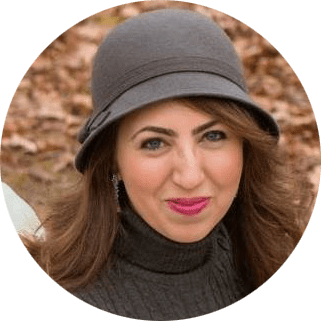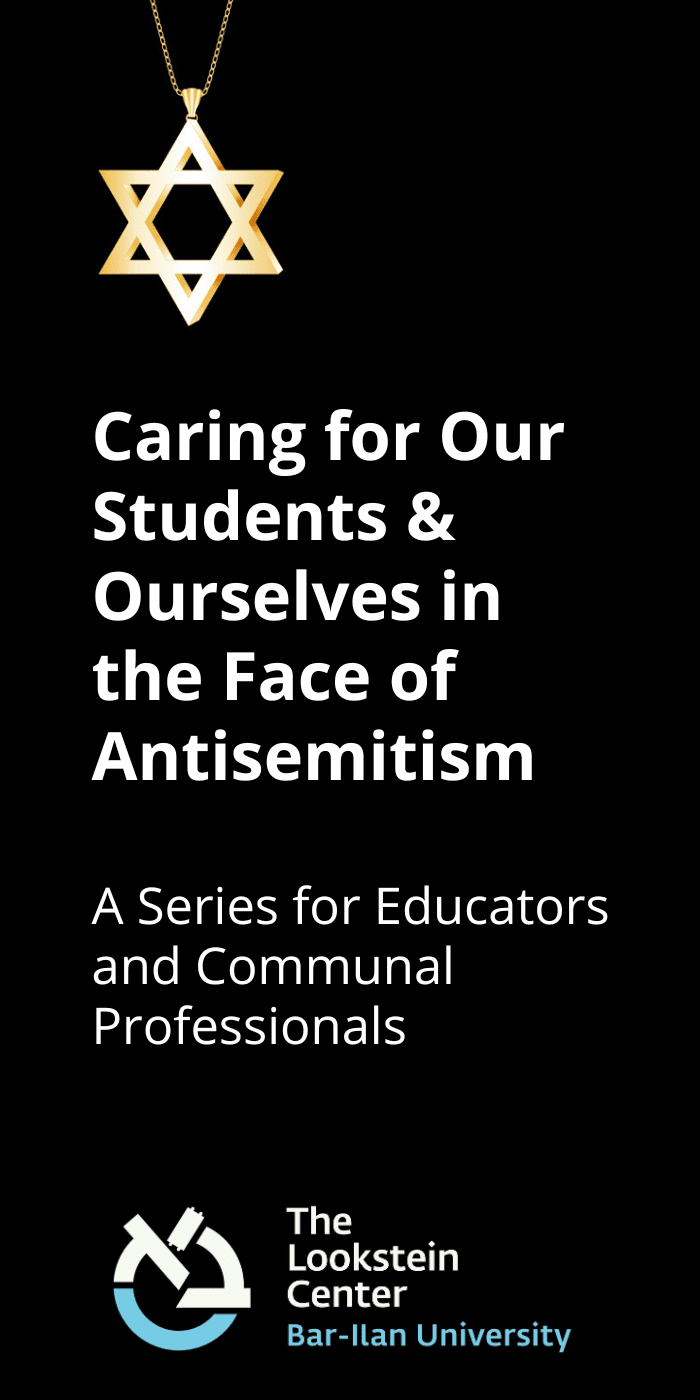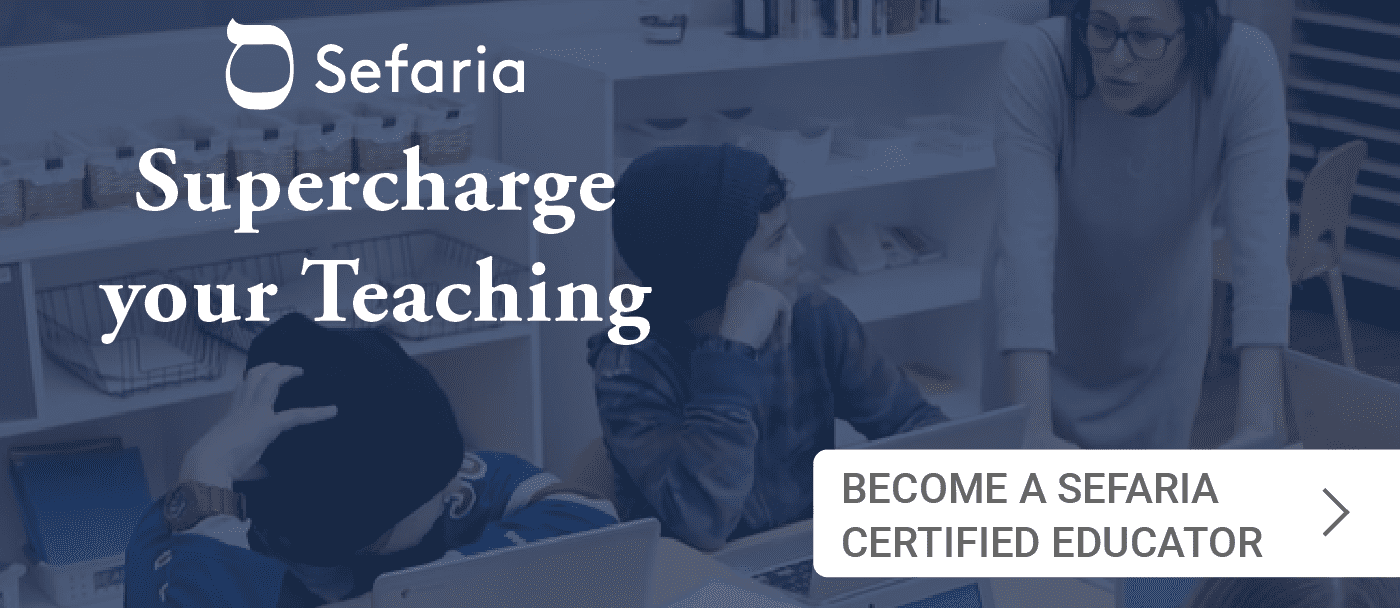Conversation with a High School Teacher, Olivia Friedman
 |
Olivia Friedman is an innovative educational thinker who teaches at Ida Crown Jewish Academy (Skokie) and is a member of the Advisory Board of Jewish Educational Leadership. In this conversation she shares her thoughts about relationships with and engaging parents who have high school age children. |
JEL: We are interested in hearing your thoughts about the role of parents in their children’s education. There are those educators who see parents as full partners and there are others who whisper that they would love to run a school for orphans, with no parents to bother them.
OF: The first piece of this has to do with the age of the child, because I think that the type of relationship will differ if you have a child who’s in kindergarten or preschool as opposed to a child who’s in high school. I think that the word that we’re looking for when it comes to parents and teachers is partnership. And while there are times when a parent is not getting along with the teacher, that should never be the starting point – the starting point should be good and robust communication from the school and from the teacher, because the greatest problems occur when there is a mismatch between the expectations of the parents and the expectations of the teacher. I once experienced this when I began teaching in a new school. In the school that I was coming from the expectation was that I would be teaching a rigorous and challenging Judaics class, like an AP course, and I brought those expectations to my honors class. The parents, however, expected that the goal of the class was to inspire their children and have them walk out feeling proud and excited to be Jews. I had a lot of trouble with that class.
I realized that back-to-school night was a great opportunity to clarify expectations; that was where I could help loop them into what their kids will be experiencing, why I was doing it that way, prepare the parents for what was coming, and give them my contact information to let them know that I was available for follow-up. On the high school level this became really important so that there are no surprises about the kind or the amount of work being assigned or why it is being assigned at all. Instead of parents calling to complain to defend their children, I try to recruit them to be allies in the educational process, especially when I explain my style of teaching, why I do it that way, and acknowledge how it may be different from what the parents grew up with. For example, in my Navi class, many parents were accustomed to content-knowledge based questions such as who-said-to-whom and traditional fact-spit-back tests, whereas my approach was more literary, exploring characters, and with project-based assessments. Explaining what I am doing and why I am doing it helps everyone to adjust.
JEL: The model you are sharing here is one in which the teacher is the professional running the show, and you are trying to bring the parent on board, which you do through communication. So that even if the parents are not active partners, they’ll understand what is going on and become supportive.
OF: Yes, that’s the beginning, but there are ways to make it much more robust than that. There are schools that have embraced the project-based learning model. In project-based learning there’s something called authentic learning and creating an authentic exhibition of learning. The idea behind that is that when students create something, they create for real people; they don’t just create it to show to the teacher, but to share it with their fellow students, their parents, or even in the community. It could involve some kind of partnership where older students teach younger ones. These authentic exhibitions of learning may have students working on a project for a while, perhaps even a semester, after which the parents and community are invited to come view the work. It’s not quite like a traditional science fair or Torah fair where everyone in sixth grade does this thing every year and you have a bunch of projects that are all the same. It’s more personalized; the idea behind the authentic learning and the project-based learning practice is that in real life people are going to have to create proposals or put together projects that they would submit to real people. If we’re trying to show students that these things are important, the greater extent to which we can make that happen the better. For example, I had students create Sefaria source sheets because I wanted them to have that skill – how to research, how to find everything, and how to put it all together. I then sent out the links to the source sheets, not just to the students, but to all their parents, and I recommended to the parents that they consider actually using their child’s source sheet for their Shavuot learning. Several parents did and afterwards emailed me about how exciting or how cool it was that they were actually able to use their children’s work in a real and meaningful way.
Another example is the “Names, Not Numbers” Holocaust film program in which students have to interview Holocaust survivors. They learn how to conduct an interview, they research their specific survivor and the situations under which that survivor lived, and then they actually conduct and record the interviews – after which the interviews are compiled into a movie which is shown to the entire community. That’s another model of what parental engagement could look like especially with middle school and high school age children.
JEL: Many of the things you describe fit a model that many people are familiar with, in which the school does something and keeps the parents in the loop. Can you envision parents who would be interested in playing a more active role in the actual educational process with their own children or impacting on the school in a way which would be healthy for the parent, the student, and the school?
OF: Yes, but it could get complicated. I’ll be candid. Many people still hold the canard that, “Those who can, do, and those who can’t, teach.” They don’t see teaching as a profession of choice, and don’t recognize that teachers have professional training and degrees or have done research in education. When parents have that kind of attitude, they think that they know how a certain subject should be taught and that they certainly know better than the teacher. Many want to re-create their own experience of when they were their child’s age, regardless of whether it was a good experience or not – they think that that’s the way it needs to be taught. In those situations, parental involvement could become quite negative. If, however, there is a mutual respect, where the parents actually do recognize the teachers as professionals with both content knowledge and pedagogical knowledge, then there is potential for fantastic partnerships. Parents could share
their expertise, either through the teacher or directly to the class, in areas that are relevant. Parents could be involved in “town hall” discussions in school, again, especially with middle and high school students.
It’s interesting, when younger kids go to school, parents often get to fill out cards in which they share their hopes and dreams for their children. What if there were an open discussion on the high school level about what parents want out of a Jewish education, why are they prepared to invest so much to send their kids to Jewish schools. This is not like a survey, but a real discussion. I wonder what kind of impact it would have if they had those conversations with the teachers, or with their own children. For some, they just want their kid in a Jewish community; for others, they really want their kids to master Jewish texts; for others, they want their kids to be inspired and committed Jews. I think it would be really powerful for parents to actually sit down and talk to their kids about that, and for teachers to hear about that too. That way they could put the student into a meaningful context. I once put together a little booklet of responses to the question of why students learn Torah – first I asked the students to record their own responses and then I had them speak to adults about the same question. It was really interesting, and what a great opportunity to include the parents in a meaningful and transparent discussion with their kids. If we do this properly, it will result in authentic parent involvement in the kid’s education.
JEL: Could you talk about how you think COVID is affecting or will affect parent involvement?
OF: When it comes to the younger grades, the teacher now has a window into the home. In the worst-case scenario parents are feeling very overwhelmed, like they’ve become the teacher in lieu of the teacher and it has led them to feel frustrated. In the best-case scenario, the schools and the teachers were very responsive to how parents felt, made fixes to try to make things better, and researched best practices. For example, I was very appreciative that my daughter had some Zoom sessions that were short, which made sense because she was five years old. She would have a small group session where she and two other kids plus the teacher would review math, English, or something which was manageable because you didn’t have that 15 to 20 kids on Zoom all trying to mute and unmute at the same time. The rest of the learning was done asynchronously – for example, they would have everything linked in one Google doc, and each day would start with the calendar date and underneath the date it would have a recorded video lesson and corresponding worksheet. The beautiful thing about this was that I was teaching high school on Zoom for multiple hours in the morning, but when I finished at let’s say 1:00 PM, I could sit down with my daughter and we could watch the video that is there forever because it was an asynchronous video, print out the worksheet, and help her if she needed help. That worked a lot better than if I had to actually get her on Zoom at the same time that I was supposed to be working and teaching myself.
I like the idea of a WhatsApp class group that includes the teachers, if teachers are willing… The school also surveyed the parents and made adjustments for this year as we’re in person with masks – I think that that’s really cool when you see that a school is seeking feedback, listening, and making changes. I think that that gives credibility to a school and to a school-parent relationship. It could be very beneficial for schools and teachers to be transparent about what they tried and didn’t work and what they’re trying instead. Parents know that the schools are in an unprecedented situation and so they have some compassion and understanding; and the schools knew that the parents were in a strange situation under lockdown trying to work from home and work with kids and so there was that reciprocity of compassion and understanding. Looking ahead, imagine what it could look like if we could harness that reciprocity going forward. It’s really easy to feel frustrated when the kids didn’t do their homework, and you sent an e-mail home and there’s no response. Sometimes it’s warranted to just give the kid an “F” on the assignment, but maybe it would be better to have a phone conversation which would start with compassion and reciprocity.
JEL: If you, as a high school teacher, could dream, what would be the kind of relationship you would want to have with a parent?
OF: I don’t like the idea of education being outsourced to schools, which is the way I think it is viewed by many parents: “The schools provide a service to teach kids about Judaism and inspire them; the parents work to pay for those services.” I believe that parents are the kids’ primary teachers; they are the key role models for their kids. What the kids see at home is far more impactful and profound than what they learn in school. I’ve seen teachers try to build on this – inviting the parents to a minyan with their kids, or doing a Shabbat together with the parents. Rabbi Fliegelman does that at Ida Crown with the freshman. The kids with their parents get to experience things together; he tries to create a partnership with the families. It sends a message to the parents that we want everyone on board and working together. This can get complicated because it means possibly challenging parents’ assumptions of what the role of a Jewish day school is and because not all parents are at the same levels of observance or adhere to the same standards that the school might be expecting.
You asked me to dream. My ideal would be that we all agree that Jewish education and Jewish identity are very important and we’re all partners in figuring out the best way to inspire kids and to help them be excited about their Jewish identity, in addition to having the skills of Jewish living and a desire to include them in their practice. Ideally we could all be candid, meaning it would be great if the school could lay out their expectations and the parents could say well this is where I think that I could partner and be on board and here’s where I’m not going to be able to help – but let’s be honest about it. That would be my ideal because if kids saw that excitement and that joy and that passion for Judaism being lived at home and being reinforced by what they learn in school, or vice versa, that would be perfect.




